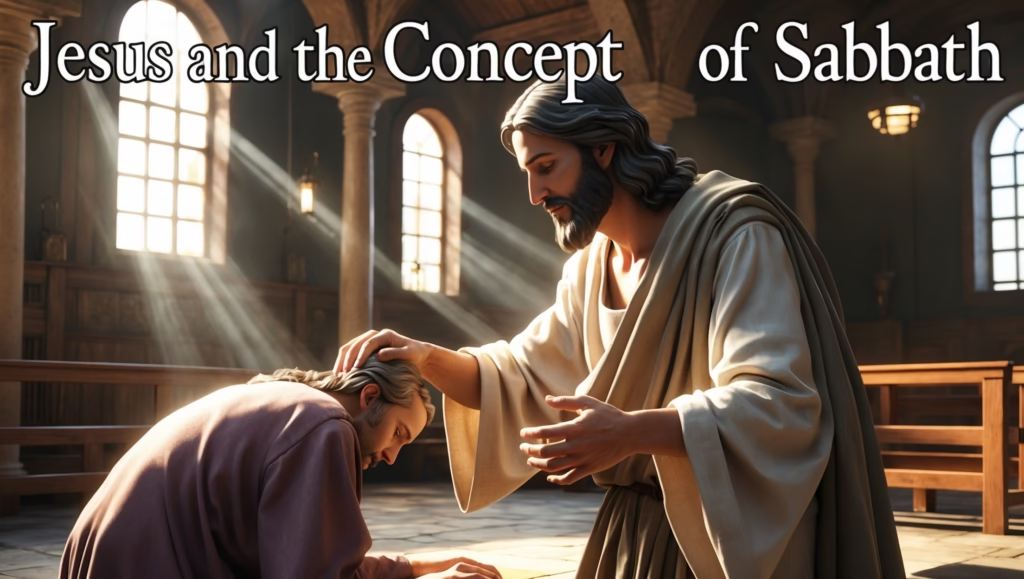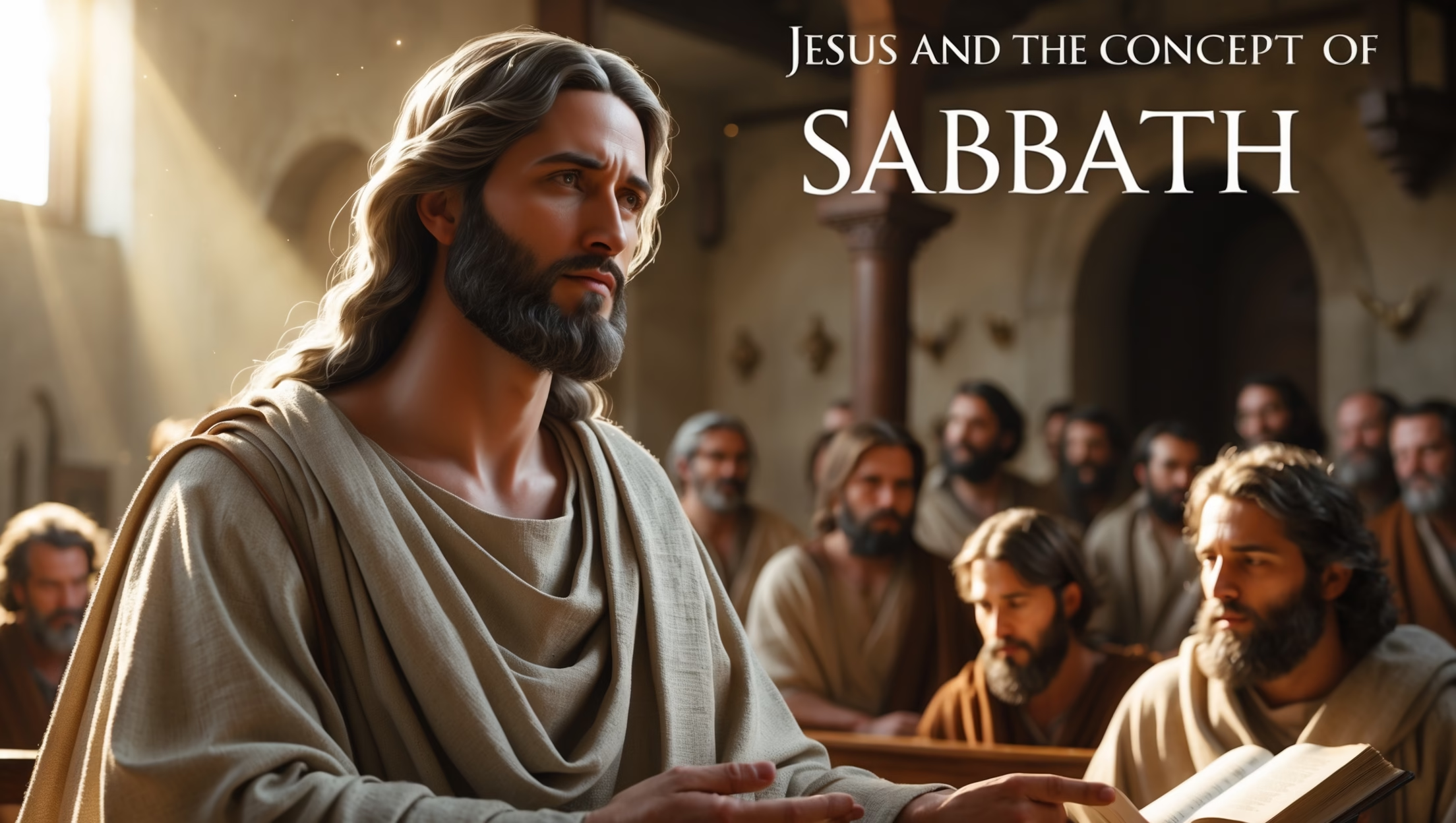Introduction
The Sabbath has always been a central theme in biblical history, representing a divine rhythm of work and rest. In Jewish tradition, it symbolized holiness, rest, and dedication to God. However, when Jesus entered the scene, His teachings and actions regarding the Sabbath caused both awe and controversy. He brought a deeper perspective to what the Sabbath truly means, shifting the focus from rigid rules to divine rest in Him. By examining the Old Testament background, Jesus’ interpretation of the Sabbath, and His practical examples of healing on this sacred day, we can gain a greater understanding of how believers today can find true rest through Him.

Sabbath in the Old Testament
The origins of the Sabbath can be traced back to creation. In Genesis 2:2–3, it is recorded that after six days of creation, God rested on the seventh day, blessing it and declaring it holy. This rest was not because God was weary but because He was setting an example for humanity. Later, in the Ten Commandments given to Israel (Exodus 20:8–11), the Sabbath became a central law: “Remember the Sabbath day, to keep it holy.” The day was meant for ceasing from labor, worshipping God, and reflecting on His provision.
For Israel, the Sabbath was also a sign of their covenant relationship with God (Exodus 31:16–17). It distinguished them from other nations and reminded them of God’s deliverance from Egypt (Deuteronomy 5:15). However, over time, religious leaders began adding numerous laws and restrictions to define what was considered “work.” What started as a gift for humanity turned into a legalistic burden.
Thus, by the time of Jesus, the Sabbath had become a heavily regulated day. Instead of focusing on rest, joy, and holiness, many people lived in fear of breaking one of the countless rules attached to it. This historical background is essential to understand why Jesus’ actions on the Sabbath seemed radical to the Pharisees and other Jewish authorities.
Jesus’ Interpretation of the Sabbath
When Jesus came, He redefined the true meaning of the Sabbath, emphasizing mercy, healing, and freedom rather than rigid observance. His teachings were revolutionary because they shifted the focus from legalism to relationship with God.
In Mark 2:27–28, Jesus declared, “The Sabbath was made for man, not man for the Sabbath. So the Son of Man is Lord even of the Sabbath.” This statement revealed two important truths. First, the Sabbath was a gift from God, designed for human well-being. It was never intended to enslave people under rules but to bless them with rest and renewal. Second, Jesus identified Himself as Lord of the Sabbath, showing His divine authority to define its meaning.
Through His ministry, Jesus challenged the distorted traditions that had made the Sabbath a burden. He reminded the people that God valued compassion, mercy, and human need over ritualistic observance. His interpretation revealed that the Sabbath pointed to Him as the ultimate rest for the soul.
Healing on the Sabbath and Redefining Its Meaning
One of the most striking aspects of Jesus’ Sabbath ministry was His choice to perform healings on this day. These acts not only brought physical restoration but also symbolized spiritual liberation. For example, in Luke 13:10–17, Jesus healed a woman who had been crippled for eighteen years. When the synagogue leader objected, Jesus responded, “Should not this woman, a daughter of Abraham, whom Satan has kept bound for eighteen long years, be set free on the Sabbath day from what bound her?” His words highlighted the true purpose of the Sabbath: freedom, healing, and restoration.
Similarly, in John 5:1–18, Jesus healed a paralyzed man at the pool of Bethesda on the Sabbath. When challenged by the Jewish leaders, He explained that His Father was always at work, and so was He. By performing such miracles, Jesus showed that doing good and bringing life aligned perfectly with the heart of the Sabbath. These healings revealed that the Sabbath is not about inactivity but about participating in God’s restorative work.
Through these actions, Jesus redefined the Sabbath from a day of restrictions to a day of divine grace. His miracles underscored that God’s mercy never rests, and His care for humanity is continuous. The Sabbath was not broken by these healings; rather, its true meaning was fulfilled.
Lessons for Modern Believers
For Christians today, Jesus’ teachings on the Sabbath carry powerful lessons. First, they remind us that the Sabbath points beyond a single day of the week—it points to Jesus Himself as the true source of rest. In Matthew 11:28–29, Jesus invites all who are weary and burdened to come to Him, promising rest for their souls. This shows that in Him, we experience the ultimate Sabbath rest, not limited to a calendar but available every day.
Second, His actions encourage us to prioritize compassion and mercy over legalism. While rest and worship are important, they must not overshadow love and service. Just as Jesus healed and restored on the Sabbath, we too are called to use our time to bring hope and healing to others. The Sabbath is about renewal, not restriction.
Third, in a world dominated by busyness, technology, and constant pressure, the principle of Sabbath reminds us to pause. Taking time for rest, reflection, and spiritual renewal is essential for our well-being. By following Jesus’ example, we can balance our work with intentional times of rest in God’s presence.
Ultimately, the Sabbath teaches us to trust God. When we cease from striving, we acknowledge that our lives are not held together by our own efforts but by His provision. Through Jesus, we find freedom from burdens, peace in chaos, and rest for our souls.
Conclusion
The Sabbath, as taught and lived by Jesus, is far more than a day of the week—it is an invitation into God’s rest. From its Old Testament origins as a sign of creation and covenant to Jesus’ radical redefinition through acts of healing and mercy, the Sabbath finds its ultimate fulfillment in Him. He is the Lord of the Sabbath, and in Him, we discover true rest, restoration, and freedom.
For modern believers, this means not only setting aside time to rest and worship but also embracing Jesus as the source of our spiritual renewal. The Sabbath is no longer a burden of rules but a gift of grace, pointing us to the eternal rest we will one day enjoy in God’s presence. Until then, every moment of rest in Jesus brings us closer to His peace and reminds us of His unending care.








